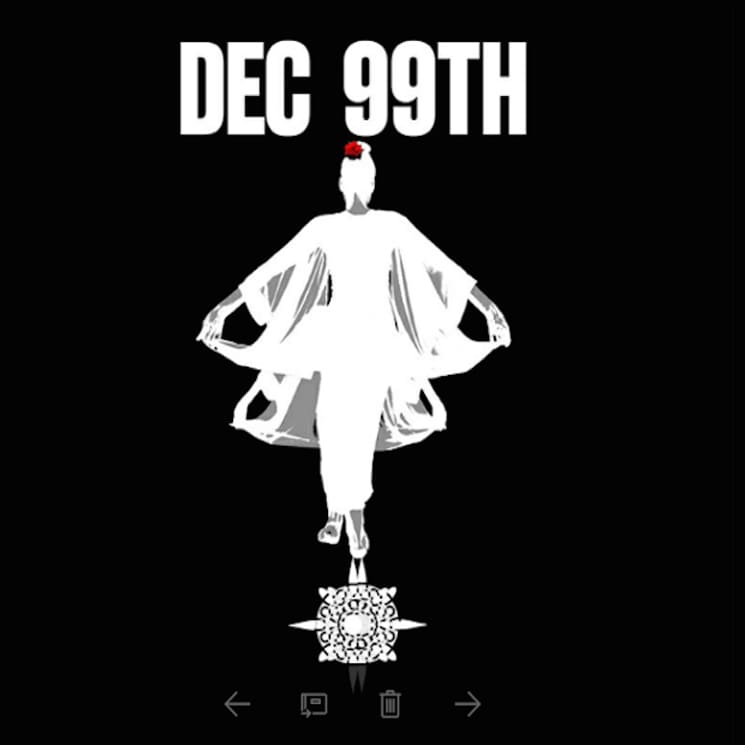It's virtually impossible to talk about Dec. 99th without talking about the context in which it was released. Earlier this year, legendary rapper Yasiin Bey, formerly known as Mos Def, was charged with using a fake passport and living illegally in Cape Town for two years. Soon after, he announced that he'd be retiring from both music and acting after releasing a final album in 2016.
Throughout the year, several concerts were announced and then cancelled due to travel restrictions, and his final album, a collaboration with journalist and producer Ferrari Sheppard called Dec. 99th, failed to materialize even after its announced release date of December 9. As the final cherry on top of a confusing sundae, Bey then announced that he would be doing two more albums on top of Dec. 99th.
So the saga of this record is an odd one that's perhaps still unfolding, but at 32 minutes, the album doesn't quite measure up to the heights of Bey's seeming ambition, or the chaos of what's transpiring around it. Despite Bey being the headliner and main draw, he spends most of Dec. 99th singing instead of presenting his trademark introspective and socially conscious lyrics, and when he does rap, it doesn't seem to be about anything in particular.
Instead, much of the spotlight is given to Ferrari Sheppard's dark, nocturnal beats, which Bey's deep voice and soulful vocals complement nicely. Dec. 99th has more in common with industrial hip-hop like Shabazz Palaces and clipping. than the conscious East Coast hip-hop that Bey helped shaped in the late '90s.
As Mos Def, Bey released one of the greatest conscious hip-hop albums of all time in Black on Both Sides, only to release two disappointing followups. In 2009, he returned with The Ecstatic, the record that many were looking for after Black on Both Sides, and it seemed like a comeback was in order. Seven years of silence and one name change later, he's released Dec. 99th, a record that has little in common with Black on Both Sides or The Ecstatic, as his alleged final album and retires.
In a vacuum, Dec. 99th is a fairly competent, if short, hip-hop/R&B project, but in terms of what it represents in Yasiin Bey's discography, it's a colossal disappointment. The rating above reflects the former, but to fans of Yasiin Bey/Mos Def, it might feel a lot lower.
(Independent)Throughout the year, several concerts were announced and then cancelled due to travel restrictions, and his final album, a collaboration with journalist and producer Ferrari Sheppard called Dec. 99th, failed to materialize even after its announced release date of December 9. As the final cherry on top of a confusing sundae, Bey then announced that he would be doing two more albums on top of Dec. 99th.
So the saga of this record is an odd one that's perhaps still unfolding, but at 32 minutes, the album doesn't quite measure up to the heights of Bey's seeming ambition, or the chaos of what's transpiring around it. Despite Bey being the headliner and main draw, he spends most of Dec. 99th singing instead of presenting his trademark introspective and socially conscious lyrics, and when he does rap, it doesn't seem to be about anything in particular.
Instead, much of the spotlight is given to Ferrari Sheppard's dark, nocturnal beats, which Bey's deep voice and soulful vocals complement nicely. Dec. 99th has more in common with industrial hip-hop like Shabazz Palaces and clipping. than the conscious East Coast hip-hop that Bey helped shaped in the late '90s.
As Mos Def, Bey released one of the greatest conscious hip-hop albums of all time in Black on Both Sides, only to release two disappointing followups. In 2009, he returned with The Ecstatic, the record that many were looking for after Black on Both Sides, and it seemed like a comeback was in order. Seven years of silence and one name change later, he's released Dec. 99th, a record that has little in common with Black on Both Sides or The Ecstatic, as his alleged final album and retires.
In a vacuum, Dec. 99th is a fairly competent, if short, hip-hop/R&B project, but in terms of what it represents in Yasiin Bey's discography, it's a colossal disappointment. The rating above reflects the former, but to fans of Yasiin Bey/Mos Def, it might feel a lot lower.
